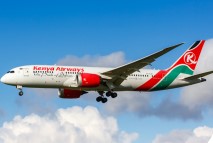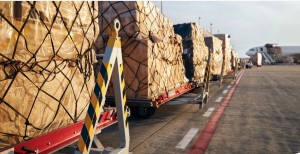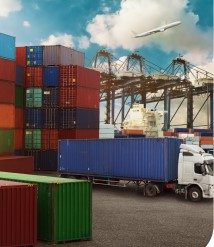
Air Freight News
Middle East & African Market
Expanding Capacity: Kenya Airways Responds to Rising Sea-Air Demand in Africa
Kenya Airways has recently introduced its second Boeing 737-800 freighter, aiming to address the escalating sea-air demand, particularly to West Africa. This addition follows the arrival of the aircraft in Kenya at the end of March, with operations commencing in April. These new freighters complement the airline’s existing fleet of two 737-300Fs.
Peter Musola, Kenya Airways’ head of cargo commercial, highlights that the enhanced range of the 737-800Fs enables the airline to serve destinations in the Middle East, India (including Sharjah and Mumbai), and various African locations. Plans are underway to expand services to Riyadh and Jeddah, along with an additional destination in India, leveraging the added capacity.
Musola notes a significant driver of demand this year: the shift from sea to airfreight volumes originating MSC’s potential deployment of an extra loader and adjustments in sailings aim to mitigate disruptions, yet challenges persist in cargo planning amidst unscheduled sailings. As the situation unfolds, stakeholders anticipate a gradual alleviation of cargo pressures, albeit with ongoing complexities from the Middle East. This shift is prompted by shippers seeking alternatives to vessel routes affected by geopolitical tensions. Kenya Airways, with its extensive network in West Africa, is strategically positioned to capitalize on this sea-air demand.
As Musola explains, “KQ is already touching into those end points in Freetown, Conakry, Monrovia, Accra,” (Brett, 2024) enabling seamless connectivity for cargo flow. This shift underscores the agility and adaptability of air cargo operations amidst evolving trade dynamics.

North American Market
Addressing Air Cargo Infrastructure Gaps: A Call to Action
The Airforwarders Association (AfA) has sounded the alarm on the precarious state of air cargo infrastructure in major US airports, asserting that the future of air cargo is in jeopardy due to insufficient investment. Brandon Fried, AfA’s executive director, emphasized at the CNS Partnerships Conference in Dallas that prolonged waiting times for trucks at airports are symptomatic of this neglect. Fried remarked, “This inefficiency disrupts supply chains and hinders economic growth” (Jeffrey, 2024).
The need for urgent action is underscored by the collapse of the Francis Scott Key Bridge in Baltimore, a stark reminder of the imperative to prioritize infrastructure safety and security. AfA and the National Customs Brokers and Forwarders Association of America have jointly identified critical areas requiring investment, Source: Jeffrey, R. (2024, April 17). Air Cargo Infrastructure Investments still critical. Air Cargo News. https://www.aircargonews.net/freight-forwarder/ air-cargo-infrastructure-investments-still-critical/ including public sector financial support, digitalization, workforce training, and modernized security protocols.

In response to airport congestion issues, AfA has garnered support from three US Senators to advocate for a comprehensive review by the Government Accountability Office. This concerted effort aims to address the pressing challenges facing air cargo infrastructure.
Author
EkaRelated posts
United States truck tonnage index up 0.3% in July
IRU member the American Trucking Associations (ATA) has been calculating the t
Streamlining Panama Canal Operations:
A 50% Reduction in Ship Queues In recent months, a significant transformation in
New Tariff Measures in US-China Supply Chains
Cargo volumes and supply chain costs for China-US services face potential strain


